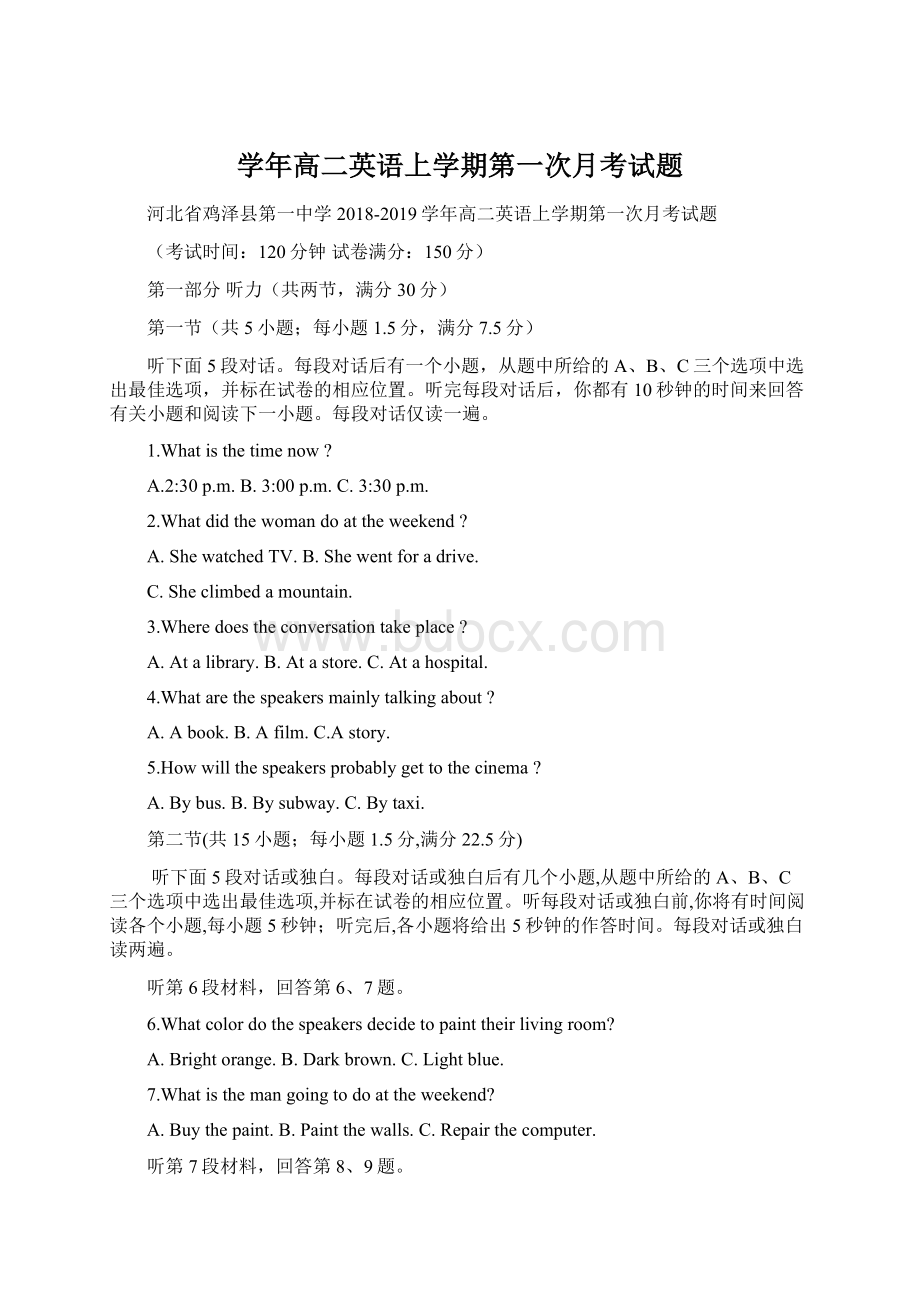学年高二英语上学期第一次月考试题.docx
《学年高二英语上学期第一次月考试题.docx》由会员分享,可在线阅读,更多相关《学年高二英语上学期第一次月考试题.docx(11页珍藏版)》请在冰豆网上搜索。

学年高二英语上学期第一次月考试题
河北省鸡泽县第一中学2018-2019学年高二英语上学期第一次月考试题
(考试时间:
120分钟试卷满分:
150分)
第一部分听力(共两节,满分30分)
第一节(共5小题;每小题1.5分,满分7.5分)
听下面5段对话。
每段对话后有一个小题,从题中所给的A、B、C三个选项中选出最佳选项,并标在试卷的相应位置。
听完每段对话后,你都有10秒钟的时间来回答有关小题和阅读下一小题。
每段对话仅读一遍。
1.Whatisthetimenow?
A.2:
30p.m.B.3:
00p.m.C.3:
30p.m.
2.Whatdidthewomandoattheweekend?
A.ShewatchedTV.B.Shewentforadrive.
C.Sheclimbedamountain.
3.Wheredoestheconversationtakeplace?
A.Atalibrary.B.Atastore.C.Atahospital.
4.Whatarethespeakersmainlytalkingabout?
A.Abook.B.Afilm.C.Astory.
5.Howwillthespeakersprobablygettothecinema?
A.Bybus.B.Bysubway.C.Bytaxi.
第二节(共15小题;每小题1.5分,满分22.5分)
听下面5段对话或独白。
每段对话或独白后有几个小题,从题中所给的A、B、C三个选项中选出最佳选项,并标在试卷的相应位置。
听每段对话或独白前,你将有时间阅读各个小题,每小题5秒钟;听完后,各小题将给出5秒钟的作答时间。
每段对话或独白读两遍。
听第6段材料,回答第6、7题。
6.Whatcolordothespeakersdecidetopainttheirlivingroom?
A.Brightorange.B.Darkbrown.C.Lightblue.
7.Whatisthemangoingtodoattheweekend?
A.Buythepaint.B.Paintthewalls.C.Repairthecomputer.
听第7段材料,回答第8、9题。
8.Whatisthepartyfor?
A.John’sbirthday.B.Christmas.C.John’swedding.
9.Whatdoweknowabouttheman?
A.He’llgotothepartywiththewoman.
B.Helooksforwardtovisitingthewoman.
C.HehastoldAnnatokeepthepartyasecret.
听第8段材料,回答第10至12题。
10.Whatwasthesurveyabout?
A.Anewshoppingcenter.B.Anewly-builtrailwaystation.
C.Atelevisionprogram.
11.Whatdoesthewomanthinkoftheplan?
A.Great.B.Stupid.C.Justso-so.
12.Whatwillthewomandonext?
A.Workonatestpaper.B.Writetoanewspaper.C.Goshopping.
听第9段材料,回答第13至16题。
13.Wherearethespeakers?
A.InBritain.B.InGermany.C.InFrance.
14.Whatdoesthewomandomostofherworkinghours?
A.Shemakescoffee.B.Shedealswithe-mails.
C.Shehandlestelephones.
15.Atwhattimedoesthewomanusuallygetoffwork?
A.4:
30pmB.4:
35pmC.5:
15pm
16.Whatisthewoman?
A.Asecretary.B.Adirector.C.Anengineer.
听第10段材料,回答第17至20题。
17.Whenisthetalkgiven?
A.Duringtheexamsweek.B.AtthebeginningofatermC.Beforethestartofavacation.
18.Whatisthemainpurposeoflectures?
A.Tointroducenewtopics.B.Toexploretopicsindepth
C.Toprovideinformationonthetextbooks.
19.Whatadvicedoesthespeakergiveabouttakingnotes?
A.Writetheexactwords.B.Remembertheexamples.
C.Focusonthemainpoints.
20.Whatdoesthespeakerremindthelistenerstodointheend?
A.Takenotesonthelecture’sadvice.
B.Borrowrecordersfromotherstudents.
C.Getthelecture’spermissionbeforerecording.
第二部分:
阅读理解
第一节(共15小题;每小题2分,满分30分)
阅读下列短文,从每题所给的A、B、C和D四个选项中,选出最佳选项。
A
Mr.JacksonlivedinthecentreofLondonbuthehadahotelneartheairport.Therealotofforeignersstayedfornight.Hedidn'tknowanyotherlanguagebutEnglishandhefounditdifficultforhimtounderstandtheforeignvisitors.
Sometimeshehadtousethebodylanguageto“talk”withthem,andtriedhisbesttomakehimselfunderstood.Buthewasoftenmisunderstoodanditbroughthimalotoftrouble.Afriendofhiswholearnedafewforeignlanguagesinauniversitywouldteachhim.Hewashappyandstudiedhard.Atfirsthelearnedsome,butsoonhefounditwasn'teasytorememberthewordsandexpressions.Hisfriendadvisedhimtowritedowntheusefulexpressionsinhisnotebooksothathecouldusethemwhennecessary.Hedidashewastold.Hefoundithelpfulforhimtodoso.
Oneeveningtherewereplentyofpeopleinthediningroom.TheywereallbusyeatingsomethingexceptaJapanese.Hewaswalkingaroundthereandwaitingforhiswifewhowasdressingherselfupupstairs.Mr.Jacksonthoughttohimself,“Themanwantstoeatsomethingbuthedoesn’tknowanyEnglish.Letmehelphim.”AsheknewonlyalittleJapanese,hehadtobringouthisnotebookandshowedittotheman,pointingtothesentence“I’mhungry”.
TheJapanesehadalookatitandgavehimtwopoundsandleft.
21.Mr.JacksonknewonlyEnglishbecause____.
A.hewasanEnglishstudentB.hehadneverbeenabroad
C.hecouldn'tlearnbyhimself
D.hehadn'tstudiedanyforeignlanguages
22.Asnotallforeignersunderstoodhisgestures,sometimesMr.Jackson____tocommunicatewiththem.
A.succeededB.fearedC.failedD.gaveup
23.TheJapanesethought____,sohegavehimtwopounds.
A.Mr.Jacksonwasabeggar(乞丐)B.Mr.Jacksonwasatranslator
C.Mr.JacksoncouldhelphimD.Mr.Jacksoncouldringhiswifeup
B
Inajobinterview,thefirstquestionisoftena"breakingtheice"typeofquestion.Don’tbesurprisediftheinterviewerasksyousomethinglike:
“Howareyoutoday?
”or“Whatdoyouthinkoftheweatherlately?
”Answerthequestionwithoutgoingintotoomuchdetail.
Talkingaboutqualificationsisthemostimportantpartofanyjobinterview.Yourqualificationsincludeyoureducationandanyspecialtrainingyoumayhavereceivedinthepast.Yourqualificationsalsoincludeyourexperienceinanypreviouswork.Itisimportanttoexplainwhatexperienceyouhaveindetail.Generally,employerswanttoknowexactlywhatyoudidandhowwellyouaccomplishedyourtasks.Thisisnotthetimetobemodest.
Trytoavoidsomebigmistakesinthejobinterview,suchasleavingthemobileonandcriticizingpreviousbosses.Theworstthingisyouyourselfhavenoquestions.Havingnoquestionsshowsyouareeithernotinterestedornotprepared.Rememberthatinterviewersaremoreimpressedwiththequestionsyouaskthanthesellingpointsyoutrytomake.
24.Thepassageismainlyabout______.
A.thetypicalquestionsaskedinjobinterviews
B.importanceofinterviewees’qualificationsinjobinterviews
C.somecommonmistakesfoundinjobinterviews
D.Do’sandDon’tsinjobinterviews
25.A"breakingtheice"typeofquestionis_______.
A.aquestionthatmakespeopleunhappy
B.anopeningquestionaskedtomakepeoplelessnervous
C.asharpquestionthatmakespeopleangry
D.aquestionaskedaboutserioustopic
26.Allofthefollowingareconsideredtobetheinterviewee’squalificationsexcept______.
A.educationalbackground
B.socialbackground
C.allkindsofspecialtrainingreceived
D.experienceinpreviouswork
27.______isnotmentionedinthepassageasamistakefoundinjobinterviews.
A.Leavingthemobileon
B.Criticizingpreviousbosses
C.Havingnoquestions
D.Arrivinglate
C
Theaveragepersonlearnsmostofthe30000~40000wordswhosemeaningsheorsherecognizesbyhearingthemorgettingfamiliarwiththeminthecontextorsimplyabsorbingthemwithoutconsciouseffort.Thebestwaytobuildagoodvocabulary,therefore,istoreadagreatdealandtoparticipateinalotofgoodtalks.Therearerelativelyfewwordsthatwelearnpermanentlybypurposefullyreferringtodictionariesorkeepingwordlists.However,eventhoseextrafewareofvalue,andnoonewillmakeamistakebyworkingondevelopingalargervocabulary.Herearesomesuggestionsofhowtodoit.
Readplentyofgoodbooks.Whenyoucomeacrossanewword,oranewmeaningofanoldword,stopandseeifyoucanunderstanditfromitscontext.Ifyoucan't,andifyoucanmanagewithoutinterruptingthethoughtofthebooktoomuch,lookitupinadictionaryorasksomebodyandthenrepeatitsmeaningtoyourselfacoupleoftimes.Ifyouarereallyconscientious(认真的),writethewordanditsmeaninginapersonalvocabularylist—preferablyusingitinasentence,oryoucankeepaspecialvocabularynotebook.Gooverthelistfromtimetotime.Further,trytouseanewwordinwritingorconversationafewtimesoverthenextseveraldays.
Listentogoodtalksandbealerttonewwordsyouhearortonewmeaningsofwordsyoualreadyknow.Thentreatthemjustasyoutreatthenewwordsyouread.
Learnandbealerttothepartsofwords:
prefixes,suffixesandroots.Knowingthemenablesyoutomakeintelligentguessesaboutthemeaningofwords.
Ifyouarestudyingaforeignlanguage,bealerttowordsinthatlanguagewhichrelatetowordsinEnglish.Englishhasinherited(继承)orborrowedmuchofitsvocabularyof500000~600000wordsfromLatin,Greek,French,SpanishandGerman.
28.Whenyoumeetanewwordinreading,whatshouldyoudo?
A.Guessitsmeaning.B.Asksomebody.
C.Lookitupinadictionary.D.Alloftheabove.
29.Accordingtothispassage,thebestwaytobuildagoodvocabularyis_______.
A.torememberalotB.toreadagreatdeal
C.totakepartinalotofgoodtalksD.bothBandC
30.Thephrase“bealertto”inthethirdparagraphmaybestbereplacedby“_______”.
A.lookatB.payattentiontoC.writedownD.learnbyheart
31.Inthefourthparagraph,theword“them”refersto_______.
A.thepartsofwordsB.prefixesC.suffixesD.roots
D
Thereisnodenyingthatsomepeoplelivetobeolderthanothers.Followedarethestandardexplanations:
keepingamoderatediet,engaginginregularexercise,etc.Butwhateffectdoesyourpersonalityhaveonyourlongevity(长寿)?
Arethereanykindsofpersonalitiescontributingtolongerlives?
AnewstudyintheJournaloftheAmericanGeriatricsSocietylookedatthesequestionsbyexaminingthepersonalitycharacteristicsof246childrenofpeoplewhohadlivedtobeatleast100.
Accordingtothestudy,thosewholivethelongestaremoreoutgoing,moreactiveandlessneurotic(神经质的)thanotherpeople.Long-livingwomenarealsomorelikelytobesympatheticandcooperativethanwomenwithanormallifespan.Thesefindingsareinagreementwithwhatyouwouldexpectfromtheevolutionarytheory:
thosewholiketomakefriendsandhelpotherscangatherenoughresourcestomakeitthroughtoughti